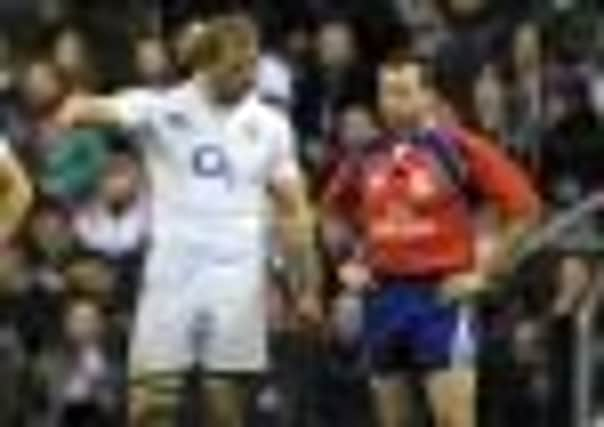England 15 South Africa 16: Poor decision-making sees England edged out in rain


England ran South Africa close for the second time this year, yet the fact that they are not celebrating a rare victory over one of the game’s leading trio came down to decision-making.
Having chipped away at a 10-point deficit with two penalties from Owen Farrell, England had the chance to snatch victory with two minutes to go.
Advertisement
Hide AdAdvertisement
Hide AdPerhaps mindful of the public dressing down he received after the previous week’s defeat to Australia, when England shunned easy points to go for tries, captain Chris Robshaw ordered Farrell to kick for the posts.
He believed it was the right option. England could have got the ball back, driven down the field and drawn either another penalty or a drop-goal opportunity.
But the fact that the enthusiastic, adventurous Farrell disagreed with the decision, and the tee for the ball took too long to get on the field as the two men argued, meant that the victory chance was squandered.
Farrell kicked the penalty, but Mouritz Botha made a hash of the restart and the Springboks closed out a game they were fortunate to win.
Advertisement
Hide AdAdvertisement
Hide AdThat it was an improved performance by England will only mean the wounds will take longer to heal.
The long-term damage is that England need to beat world champions New Zealand next week to have any chance of climbing into the top four for the 2015 World Cup draw two days later.
What is more worrying though is the lack of authoritative leadership and the muddled thinking out on the field, that for a wholehearted England’s improvements, is the big millstone hanging around their neck.
What should have happened in that pivotal moment is that Robshaw should have ordered Farrell to kick for touch. When he did not, he should have been firm in his decision to kick for the points, not allowing Farrell to defy him so publicly.
It was a shambolic end to what had been a gutsy effort.
Advertisement
Hide AdAdvertisement
Hide AdIn a way, Stuart Lancaster has made a rod for his own back. One of his revolutionary changes when he took charge was to have a leadership group, where a group of ‘on-field generals’ make the decisions.
In itself, that negates the impact of the one leading voice, and when Robshaw’s voice needed to be the only one heard, it was not.
Credit to Robshaw; afterwards he was quick to take the responsibility for the embarrassing way it was handled.
Farrell had changed his tune an hour later when he said “Robbo makes the call and we back him”, despite the 81,151 crowd seeing him passionately disagree with his captain.
Advertisement
Hide AdAdvertisement
Hide AdOnly Tom Wood broke ranks. “Maybe (the previous week) played on our minds a little bit in the final stages,” he said.
Criticised one week for not kicking the points, chastised the next for doing exactly that – England are damned if they do, damned if they don’t.
But Test match rugby is about fine margins.
Their improvement from the limp Australia performance deserved better than a narrow defeat and questions about leadership.
They did what everyone says you need to do to beat the Boks, match them physically.
Advertisement
Hide AdAdvertisement
Hide AdThey pounded them in the scrum, though their lineout was weak.
The Red Rose started in determined mood, the forwards led by Tom Youngs and Joe Launchbury in the loose, and the front row in the scrum, presented Toby Flood with four kicks at goal.
That he only took two of them, missing twice from the right, would prove costly.
Patrick Lambie, the Springboks’ fly-half, kicked three from three to give South Africa a half-time lead in the teeming rain.
Advertisement
Hide AdAdvertisement
Hide AdLancaster’s men showed glimpses of what they can do in the open field, with makeshift wing Mike Brown twice breaking loose. Flood’s grubber kick behind the defence to the rampaging Manu Tuilagi bounced out of touch.
The bounce of the ball went horribly against England three minutes into the second half.
After winning a penalty deep in the England 22, the Springboks opted to kick to touch and from the lineout, Ben Youngs’s fly-kick clear rebounded off JP Pietersen and back towards the try line. When a wrong-footed Wood failed to gather it, South Africa flanker Willem Alberts dropped on the ball.
The referral to the video referee, and Lambie’s expert conversion, made it a 10-point game.
Advertisement
Hide AdAdvertisement
Hide AdCredit England for fighting back. Tuilagi intercepted inside his own 22 and burst forward, offloading to Chris Ashton. Two years ago the former rugby league flyer would have scored but he lacked the confidence and his short pass left Brown with too much to do.
Farrell kicked penalties on 62 and 73 minutes, and then that controversial one with a little over a minute to go. It was not enough.
Back in their traditional white, England were at least back in the fight.
But the cold hard facts are that this was a fourth defeat in six games for a team that are a long way off the finished article.
Advertisement
Hide AdAdvertisement
Hide AdEngland: Goode, Ashton, Tuliagi, Barritt, Brown, Flood (Farrell 46), B Youngs (Care 67); Corbisiero (Vunipola 53), T Youngs (Paice 67), Cole (Wilson 76), Launchbury (Botha 73), Parling, Wood (Haskell 53), Robshaw, Morgan. Unused replacements: Joseph.
South Africa: Kirchner, Pietersen, de Jongh, de Villiers, Hougaard, Lambie, Pienaar; Steenkamp (van der Merwe 62), Strauss, (Brits 75) du Plessis, Etzebeth, Kruger, Louw, Alberts (Coetzee 57), Vermeulen. Unused replacements: Jantjies, Taute, Mvovo.
Referee: N Owens (Wales).